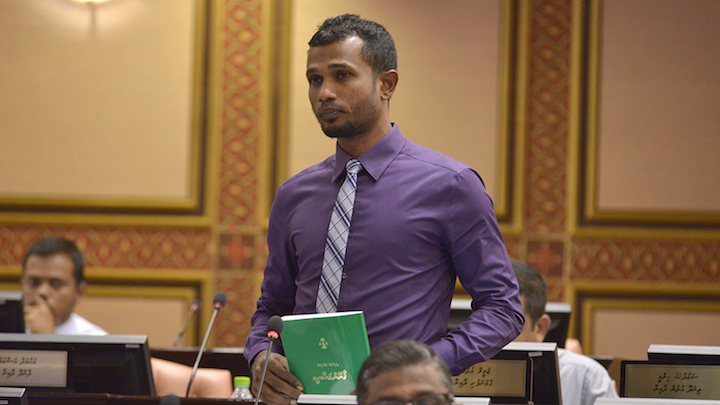The parliament today amended the new penal code to require all appeal processes be exhausted before Islamic sharia punishments can be meted out to convicts.
The amendments proposed by ruling Progressive Party of Maldives (PPM) MP Ahmed Thoriq state that the Supreme Court must pass a final sentence before convicts found guilty of offences for which penalties are prescribed in Islamic Sharia are punished.
These offences include murder, fornication, theft, apostasy and drinking alcohol, for which punishment ranges from death penalty to public flogging.
The amendments also authorises the president “to make decisions” on such punishments in accordance with Islamic Sharia. The president has the authority to pardon convicts and commute sentences under the clemency law.
Both provisions were added to Thoriq’s amendment bill during a review by the national security committee. The revised bill was passed unanimously with 51 votes in favour at today’s sitting.
Thoriq had submitted the bill earlier this month to amend the section on hudud offences, which had stated that persons found guilty of an offence with punishments prescribed in the Quran shall be punished in accordance with sentencing guidelines in the penal code.
Thoriq proposed replacing ‘Quran’ with ‘punishments or qisas [retaliation in kind] determined in Islamic Sharia.’
The Quran prescribes punishments for six hudud offences: theft (amputation of the hand), fornication (death by stoning or one hundred lashes), making unproven accusations of illicit sex (eighty lashes), drinking intoxicants (eighty lashes), apostasy (death or banishment), and highway robbery (death).
Islamic Sharia encompasses both the Quran and the Prophet’s sunnah (teachings or traditions), which also prescribes punishments.
The new penal code that came into force on July 16 provides for the application of some Sharia punishments to hudud offences (including flogging and death penalty), but the “retaliation in kind” aspect or qisas was not incorporated. The qisas category of crimes in Islamic jurisprudence includes murder, assault, and damage to private property.
“Notwithstanding other provisions of this law to the contrary, if an offender is found guilty of committing an offence to the extent of practical certainty as per the standard of proof established in Islamic Sharia, for hudud offences or for which punishments or qisas are determined in the Islamic Sharia, that person shall be punished in accordance with Islamic Sharia,” reads the amendment passed today.
The penal code has been hailed as a landmark law that codified Islamic sharia for the first time while upholding minimum international human rights standards.
However, a day before it was due to come into force, religious NGO Jamiyyathul Salaf contended that the law “completely does away with” the sunnah under a “secular philosophy”.
The sunnah is one of the “fundamental sources” of sharia law and specifies how punishments prescribed in the Quran must be enforced, Salaf said.
Several punishments fixed in the Quran such as amputation of the hand for theft, death by stoning for adultery, death for highway robbery, and death or banishment for apostasy are not enforced in the Maldives.
However, flogging for pre-marital sex is implemented while the current administration has ended a six-decade moratorium on the death penalty.
In April, the pro-government majority in parliament delayed the enforcement of the new penal code by three months, claiming that more time was needed to raise public awareness and address concerns raised by religious scholars.
Days before the penal code came into force, the Supreme Court drafted a penal code of its own, prompting fears that the new law could be overhauled.
The Supreme Court’s draft proposed lowering the age of criminal responsibility to seven years and sets hefty fines and jail terms for defaming a state employee.
However, the parliament suspended its sittings to block MPs from submitting any changes. Explaining the decision to suspend sittings, a senior ruling party MP told Maldives Independent: “We will not allow the judiciary to dictate laws and overstep its mandate.”
A source familiar with the apex court’s draft said it will undo ten years of work put into modernising the Maldives’ criminal justice system.
Correction: The tenth paragraph of this article was amended on August 30 to state that only some Shariah punishments were outlined in the new penal code. It previously incorrectly suggested that the penal code allowed for the application of all Shariah punishments for hudud offences.
The eleventh paragraph of this article was amended on September 1.



















